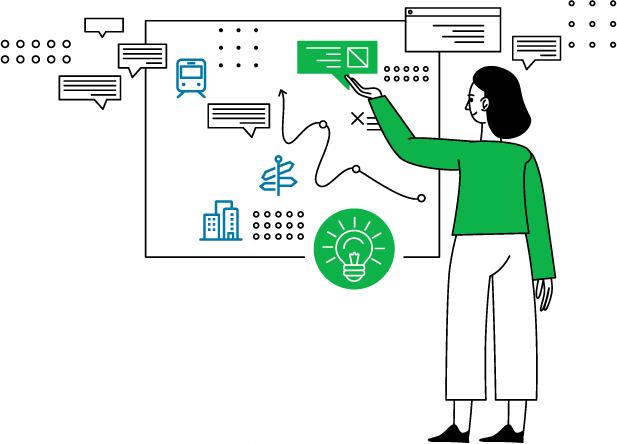

This is a time when Canada must harness its community-driven resilience. We’re asking you to share examples of how Canadian communities are responding to the crisis with creativity and imagination. Collective problem-solving and collaboration will be instrumental in how Canada mitigates the local impacts of COVID-19 and creates on-the-ground solutions.
Highlighted Initiatives
A bike path connecting Canada and the US will be found on the new Gordie Howe International Bridge connecting Windsor and Detroit
The multi-use path will work for pedestrians and cyclists. Community, including Bike Windsor Essex, advocated for the appeal and usefulness of the route to support active transportation and a healthy lifestyle while also contributing to cycle tourism across the border. Pedestrians and cyclists will need to bring passports/documentation to cross the border when the bridge opens in 2024 — but Canada will waive the bridge tolls.
City of Toronto partners with Vaccine Hunters Canada to help residents quickly find available vaccine appointments at City-run clinics
The City of Edmonton is transforming a series of surface parking lots into a new downtown park
Located in the Downtown Warehouse District, the Warehouse Campus Neighbourhood Central Park will cover 1.33 hectares (roughly 13,300 square metres or just over 2 football fields) between 106 Street and 108 Street and Jasper Avenue to 102 Avenue. The downtown population is expected to significantly increase in the next decade. This park will serve as a major public amenity for residents and businesses. The design of 106 Street from Jasper Avenue to 102 Avenue will be integrated into the scope of work for Warehouse Campus Park. This project is a significant catalyst project identified in the Capital City Downtown Plan, and is fully funded by the Capital City Downtown Community Revitalization Levy.
Micro-retail spaces designed and programmed to advance, grow and celebrate creative retail.
Powered by San Jose Made, MOMENT embodies the urgency, immediacy and verve of today’s new retail and creative culture, featuring makers, creatives, artists and emerging brands for varying short-to-mid-length durations. Located in downtown San Jose within the ever-popular San Pedro Square neighborhood, MOMENT is perfectly positioned to elevate these already-amazing businesses, brands and talent to newer and greater levels of visibility at a time when San Jose itself is rising to newer and greater levels of visibility.
Montreal’s “Parklets,” — definitions, examples, benefits, implementation frameworks
Pilot Project Evaluations: Strengthening Public Market Systems in Pittsburgh, Seattle, and Toronto
Project for Public Spaces provided leading market organizations in each city with pro bono technical assistance and a planning grant to audit each city’s existing market system, identify challenges and opportunities, and convene a broad group of stakeholders to advocate for new policy and governance structures.
A collection of inspiring case studies on good public spaces as the backbone of the sustainable city from across Asia.
A collection of 43 cases, equally spread in over 15 countries throughout Asia. From Singapore to Asahikawa, and Hanoi to Mumbai, municipal governments, urban planners, activists, architects, placemakers and real estate developers are pioneering to create human-scale streets and loveable places, using a more cocreative approach to urban development. With The City at Eye Level Asia we bring you key insights and lessons learned from Asia’s front-runners in creative and community-led placemaking, heritage revitalization and place-led development, that are inspiring more future-proof places for people
European web-platform for placemakers and placemaking tools
We strongly believe that our members, publications, events and tools will help you through your placemaking journey.. We are a network of thousands of placemakers primarily based and working in Europe. We are the proud network behind Placemaking Week Europe. We connect to share our experiences, develop tools, champion each other, and work together to make great places. We are so excited to welcome you to the community.
Finding Joy through Playful Learning Conference Resource Guide
Virtual conference recordings and presentations that brought together educators, researchers, policymakers, and practitioners support children and families in learning through play.
A central portal for placemaking that harnesses the agency of communities across Ireland to amplify their potential in a way that can transform their physical, social, psychological well being.
Reimagine is a nationwide placemaking programme by the Irish Architecture Foundation, working with communities across Ireland to co-create and co-design solutions to problems or opportunities they’ve identified in their locality.
Reimagine matches architects with local partners, enabling communities to play an active role in the development of their neighbourhoods, streetscapes, parks, villages and towns.
How a Twitter bot is helping people in high-risk downtown Toronto get vaccinated
Behind the bot is Dayi Lin, a 28-year-old computer scientist who also lives in the area. His bot quickly amassed a following of a few hundred people within days of its creation and with no advertisement on Lin’s part — a testament to how residents in downtown east and west, where rates of COVID-19 are high, continue to exhaust every option available in order to secure a vaccine in the absence of a centralized, provincial booking system.
BIKEPOC group working to make Toronto’s cycling community more welcoming to under-represented groups
BIKEPOC partners with local community bike groups like Charlie’s FreeWheels and Bike Chain to build and repair donated bikes. They completed 20 bike matches last year, getting bikes in the hands of women, children and people of colour.
Public art installations in response to COVID-19 — street games with social distancing.
Redesigned street games
Play some of your all time favourite street and playground games, but with a twist! The kids will love it!
We’ve removed all physical contact from the games we host, and replaced it with fun and playful alternatives!
Our sessions are hosted by us! We explain the rules, guide you through the games, and maybe even join in.
Design Ideas for the Post-Pandemic Public Library
The ideas came out of the findings from a survey of the American Library Association (ALA) community and a virtual roundtable with representatives who lead or operate 10 public libraries across the U.S. Both the survey questions and the roundtable discussion focused on the current challenges public libraries are facing and opportunities for long-term change in response to the pandemic.
ULI’s forthcoming report — Global Innovations for Health, Social Equity, and Sustainability
The Urban Land Institute’s Building Healthy Places Initiative profiled more than 30 approaches to the public realm during the pandemic from around the globe, representing a range of cities—small and large, on different continents, implementing pilot projects or accelerating long-term plans. The examples illuminate how cities can innovate with low-cost, immediately responsive, and creative interventions that promote health and social equity. Several of these examples, spanning four different types of public space projects, are highlighted in this article. The Pandemic and the Public Realm: Global Innovations for Health, Social Equity, and Sustainability is a forthcoming report of ULI
Tools and solutions that look at various ways behavioral science can be useful to deal with COVID-19
The Behavioral Side of COVID-19 Blog Series
- Social Distancing & When to Seek Medical Help
- When Social Distancing Is Impossible: Humanitarian Crises and Human Behavior
- So You’re Working From Home? Make the Most of it with Behavioral Science Tips
- Behavioral Insights for Keeping Your Sanity While Working at Home with Kids
- When Panic Buying Hurts: Strategies to Lessen the Impact on WIC Participants
- Designing for Effective Physical Distancing in Essential Public Spaces
- Inoculating Democracy from COVID-19
- Resources for Making Financial Supports Behaviorally Informed During a Crisis
- Behavioral Design for Public Agencies’ COVID-19 Response
- Making Government COVID-19 Communications More Effective
- COVID-19 Is Different–Charitable Giving Should Be Too
- Could Temporary, Behaviorally Informed Changes to WIC Be Program Fixtures?
- What Behavioral Science Can Teach us 4+ Months into the COVID-19 Pandemic
- New Playbook Helps Officials Prepare People to #VoteSafe
- Now Is the Time to Improve the WIC Participant Experience
- The College Student Journey in the Time of COVID-19
- 8 Strategies for College Leaders Advancing Change Initiatives
- Using Behavioral Insights to Make the Most of Emergency Social Protection Cash Transfers
- Brain, Meet Modern Journalism
- Boosting Student Voter Participation During a Pandemic
- Helping Community Food Advocates Spread the Word about Pandemic-EBT Food Benefits to NYC Families
Designing for Effective Physical Distancing in Essential Public Spaces
Ideas for the public spaces we are likely to emerge for during this period of physical distancing – grocery stores, pharmacies, parks, and the streets that get us to and from. Includes:
Grocery Stores & Pharmacies: Tips for Streamlining the Process of Buying Essentials Safely
Public Sidewalks: Helping People Keep a Safe Distance to and from Essential Services
Public Parks: Tools for Discouraging Gathering in Public Spaces While Allowing People to Get Fresh Air and Exercise
Speculative design concepts that have emerged from the coronavirus pandemic
A few design proposals to emerge from a range of international firms large and small. All of these concepts tackle unique topics and concerns: A more prudent use of public green space, contagion-safe produce shopping, the adaptive reuse of unorthodox spaces, and working where you live for the long-haul, to name a few. And while some might seem unconventional or outright implausible, these concepts all imagine a world where we are all safe, comfortable, healthy, productive, and able to get the help that we need.
How to Reopen and Promote Safe Usage of Playgrounds
An actionable resource for playground owner/operators as they plan for reopening. Includes tips, a webinar recording, and other resources
7 smart and simple ways cities can encourage social distancing in public spaces
The challenge of keeping apart means public areas such as parks, plazas, markets and restaurants are all experimenting with ideas that keep people safe.
Spatial Strategies for Restaurants in Response to COVID-19
The recommendations and prompts in this document seek to come alongside restaurant
owners, chefs, staff, and patrons as we navigate our evolving understanding of COVID-19 in
restaurant settings and attempt to adapt ideal recommendations to real-life situations. The
faster we can design trust back into these spaces, the faster we can stabilize and strengthen the
restaurant industry.
Proximity of Care Design Guide: design and implementation of child- and family friendly interventions in vulnerable urban environments, with benefits for the entire community.
Arup and the Bernard van Leer Foundation have combined their design and planning expertise and knowledge of early childhood development to produce the Proximity of Care Design Guide. The Guide builds upon the Bernard van Leer Foundation’s Urban95 initiative, which asks a bold but simple question:
If you could experience the city from 95cm – the height of a 3-year-old – what would you change?
The Design Guide seeks to answer this question by helping professionals and decision makers operating in informal and refugee settlements to design and implement cost-effective interventions that improve the living conditions and well-being of young children, their caregivers and pregnant women, with benefits for the entire community. A good start in life for the youngest urban residents is one of the best investments a city can make.
Evaluation of COVID-response Complete Street activation (Toronto’s Destination Danforth)
Destination Danforth is part of a suite of ActiveTO programs designed to support the City of Toronto’s restart and recovery response to COVID-19. These programs are part of a period of unprecedented rapid program implementation and therefore deserve careful evaluation.The evaluation of the Destination Danforth Complete Street installation was conducted by Park People and The Centre for Active Transportation (TCAT) in September/October 2020.
Public space and equity: new research on community-led public spaces (Webinar and resources)
How can we leverage this moment in time — as billions of dollars are being released for infrastructure projects — to build more inclusive, equitable public spaces moving forward? On Episode 24 of “Coast to Coast,” we’ll unpack findings from forthcoming research from Knight and Gehl on community-led, equitable public spaces that serve and engage communities in the pandemic and beyond.
EPISODE RESOURCES
- Knight Foundation report conducted by Gehl evaluates 7 public spaces in the U.S. to identify their successes and make recommendations for their improvement: kf.org/adaptivespace
- The Knight Report, “Adaptive Public Space: Places for People in the Pandemic and Beyond,” finds that public spaces that reflect the needs of residents received more visitors: kf.org/placesforpeople
- Knight’s Lilly Weinberg and Evette Alexander share their thoughts on the newly published Knight Foundation report, which evaluated the impact of public spaces: kf.org/equitablespaces
- Gehl uses a people-first approach to urban planning to create a future where people have more control over the communities they live in: gehlpeople.com
- Centennial Parkside is led by residents and organizations and seeks to preserve and revitalize the community with initiatives around healthy living, civic engagement and the arts: centennialparkside.org
- Reimagining the Civic Commons is transforming the way communities can manage civic assets to foster equity, engagement, economic development and environmental sustainability: civiccommons.us
HerCity: Digital Toolbox for Sustainable, Equal and Inclusive Cities
HerCity is a platform that involves women in urban development, in order to make better cities for everyone. Turning the tables and putting girls in the expert position, the digital toolbox aims to create more inclusive, equal, and sustainable cities and communities. The initiative makes methods and tools available to urban actors globally, in order to support cities in integrating girls’ participation in their long-term strategies. A toolbox with 9 flexible building blocks, Her City supports urban development from a girl’s perspective. We guide urban actors to implement projects through a step-by-step methodology providing an open and digitally accessible platform for all. We facilitate an ongoing dialogue between professionals and citizens.
Mural project in Durham Region is using crowd-sourcing to fundraise
Signs of Life supports the growth of healthy, happy communities impacted by COVID-19 across Durham Region by recognizing our creative economy, using art as a vehicle for participation to deepen public discussions and contemplation on core values and civic issues, through non-partisan regional-wide projects. We are a social hub for artists, organizations, and citizens who want to be more engaged in public life, and for our citizens to be proud of the place they call home. We want people to park their cars and feel safe to get out, walk around, connect with their neighbours, interact and be inspired by Signs of Life murals. We want them to spend money at local businesses that share in the current hardships our main streets are currently facing as we look to recover in the era of COVID-19.
The City of Mississauga’s Public Art Program invites Ontario-based artists to submit proposals of new or existing light-based artwork to be a part of Light Up the Square (LUTS) 2021 – a new outdoor, multi-week, destination festival of night lights in Mississauga’s Celebration Square
For this project, the City of Mississauga is seeking large-scale, medium, or small existing works and/or new commissions in a variety of mediums that center on ideas and themes of hope and renewal. Where possible, artwork should offer an inviting and accessible visitor experience. The submission guide is available on this site.
City of Edmonton waives business improvement area levy and invests in UV air purification for transit
Edmonton will spend $12 million this year on COVID-specific initiatives to help the city cope with the pandemic. The funding includes tax relief for businesses in 13 areas of the city and $1.3 million to support vaccination operations at the EXPO Centre. It includes nearly $6 million to install ultraviolet air-purification technology in Edmonton Transit vehicles.
Making Edmonton Digital helps businesses get online
A partnership between the University of Alberta, City of Edmonton, and Digital Main Street, is helping local businesses create and maintain an engaging online presence. Funded by the City of Edmonton and Western Economic Diversification Canada, the free program connects business owners with a consultant who can work with them for a maximum of 12 hours. Services could include learning how to update Google listings, creating websites or accounts on social media channels, and work on branding. The program will run until September, or when they reach a total of 630 businesses. So far, approximately 400 businesses have signed up.
Be a CityShare contributor
We want to hear from you on what’s working, what’s not and what’s next in your community.






